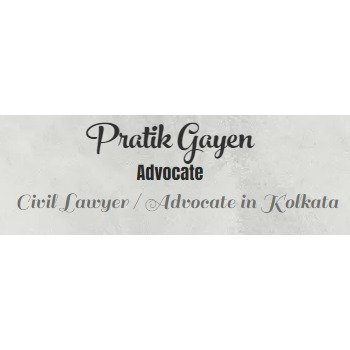Best Child Support Lawyers in Kolkata
Share your needs with us, get contacted by law firms.
Free. Takes 2 min.
Free Guide to Hiring a Family Lawyer
List of the best lawyers in Kolkata, India
About Child Support Law in Kolkata, India
Child Support in Kolkata, India is governed by various laws and regulations that aim to ensure the financial support and well-being of children. It is a legal obligation for both parents to provide financial assistance to their children, even in cases of separation, divorce, or non-marital relationships. Child support laws in Kolkata prioritize the best interests of the child and aim to guarantee their right to an adequate standard of living.
Why You May Need a Lawyer
There are certain situations where seeking legal assistance from a lawyer specializing in Child Support can be beneficial:
1. Establishing or modifying Child Support: If you need assistance in establishing a child support agreement or modifying an existing one, a lawyer can guide you through the legal proceedings and ensure that your child's best interests are protected.
2. Enforcement of Child Support: If the non-custodial parent fails to fulfill their child support obligations, a lawyer can help you take legal action to enforce the payments, ensuring that your child receives the financial support they are entitled to.
3. Child Support Disputes: In case of any disputes related to child support, such as disagreements over the amount of support or issues regarding expenses, a lawyer can provide legal advice and represent your interests during negotiations or court proceedings.
Local Laws Overview
In Kolkata, India, child support laws are governed by various legislations, including:
1. The Guardians and Wards Act, 1890: This act outlines the legal rights and responsibilities of parents in relation to their children and provides guidelines for child custody and maintenance.
2. The Hindu Minority and Guardianship Act, 1956: This legislation applies to Hindu families and regulates matters related to guardianship, custody, and maintenance of children.
3. The Protection of Women from Domestic Violence Act, 2005: This act emphasizes the protection of women and children in domestic relationships. It ensures the provision of financial support for children in cases of domestic violence.
It is essential to consult with a lawyer familiar with these local laws to navigate Child Support proceedings effectively.
Frequently Asked Questions
1. Can child support be arranged without going to court?
Yes, child support arrangements can be made outside of court through mutual agreement between the parents. However, it is recommended to formalize the arrangement by obtaining a court-approved consent order to ensure it is legally binding.
2. How is the amount of child support determined?
The amount of child support is typically determined based on the income, financial resources, and needs of the child. The court considers factors such as the parent's income, living expenses, and the number of children involved to calculate a fair and reasonable amount of support.
3. What happens if the non-custodial parent refuses to pay child support?
If the non-custodial parent fails to pay child support, the custodial parent can seek legal remedies. This may include filing a complaint with the court, which can result in enforcement actions such as wage garnishment, property liens, or even imprisonment in extreme cases.
4. Can child support orders be modified?
Yes, child support orders can be modified if there is a significant change in circumstances. For example, if there is a change in income, employment status, or the child's needs, either parent can request a modification through the court to adjust the amount of child support.
5. Until what age is Child Support applicable?
Child Support is generally applicable until the child reaches the age of majority, which is 18 years old in India. However, in certain cases, such as if the child is pursuing higher education, child support obligations may extend beyond the age of majority.
Additional Resources
For further information or assistance regarding Child Support in Kolkata, India, you may find these resources helpful:
1. West Bengal Legal Services Authority: Provides legal aid and advice to individuals who are unable to afford legal representation. Contact: .
2. National Commission for Protection of Child Rights: A governmental body focused on safeguarding the rights and welfare of children in India. Website: .
3. ChildLine India Foundation: An organization dedicated to child protection and support. They provide a helpline number (1098) for emergencies and support-related queries. Website: .
Next Steps
If you require legal assistance for Child Support matters in Kolkata, India, it is recommended to take the following steps:
1. Research and shortlist lawyers specializing in Family Law and Child Support in Kolkata.
2. Schedule consultations with selected lawyers to discuss your specific case and gather information regarding their expertise, experience, and fees.
3. During the consultation, explain your situation in detail and ask any questions to clarify doubts or concerns.
4. Based on the consultations, choose a lawyer whom you feel comfortable with and who can best represent your interests.
5. Work closely with your chosen lawyer, providing all necessary information and documentation required to proceed with your Child Support case.
Remember, every case is unique, and it is essential to consult with a legal professional to receive personalized advice based on your specific circumstances.
Lawzana helps you find the best lawyers and law firms in Kolkata through a curated and pre-screened list of qualified legal professionals. Our platform offers rankings and detailed profiles of attorneys and law firms, allowing you to compare based on practice areas, including Child Support, experience, and client feedback.
Each profile includes a description of the firm's areas of practice, client reviews, team members and partners, year of establishment, spoken languages, office locations, contact information, social media presence, and any published articles or resources. Most firms on our platform speak English and are experienced in both local and international legal matters.
Get a quote from top-rated law firms in Kolkata, India — quickly, securely, and without unnecessary hassle.
Disclaimer:
The information provided on this page is for general informational purposes only and does not constitute legal advice. While we strive to ensure the accuracy and relevance of the content, legal information may change over time, and interpretations of the law can vary. You should always consult with a qualified legal professional for advice specific to your situation.
We disclaim all liability for actions taken or not taken based on the content of this page. If you believe any information is incorrect or outdated, please contact us, and we will review and update it where appropriate.
















